Connect With Us
Blog
Items filtered by date: April 2024
Early Indications of Rheumatoid Arthritis and Its Impact on the Feet

Rheumatoid arthritis, or RA, manifests through subtle yet telling signs, especially in its early stages. A common indicator is persistent joint stiffness, particularly in the mornings or after periods of inactivity. Accompanying this stiffness is often joint pain and swelling, which can gradually worsen over time. RA does not discriminate, affecting various joints throughout the body, including those in the feet. In fact, the feet are commonly among the first areas affected by RA. The condition can lead to inflammation in the joints of the feet, causing pain, swelling, and difficulty with mobility. Over time, RA may cause deformities such as bunions, hammertoes, or joint collapse in severe cases. If you are experiencing any of the above symptoms in your feet, it is strongly suggested that you are under the care of a podiatrist who can offer you effective management strategies.
Because RA affects more than just your joints, including the joints in your feet and ankles, it is important to seek early diagnosis from your podiatrist if you feel like the pain in your feet might be caused by RA. For more information, contact David Williams, DPM of El Paso Feet. Our doctor will assist you with all of your podiatric concerns.
What Is Rheumatoid Arthritis?
Rheumatoid Arthritis (RA) is an autoimmune disorder in which the body’s own immune system attacks the membranes surrounding the joints. Inflammation of the lining and eventually the destruction of the joint’s cartilage and bone occur, causing severe pain and immobility.
Rheumatoid Arthritis of the Feet
Although RA usually attacks multiple bones and joints throughout the entire body, almost 90 percent of cases result in pain in the foot or ankle area.
Symptoms
- Swelling and pain in the feet
- Stiffness in the feet
- Pain on the ball or sole of feet
- Joint shift and deformation
Diagnosis
Quick diagnosis of RA in the feet is important so that the podiatrist can treat the area effectively. Your doctor will ask you about your medical history, occupation, and lifestyle to determine the origin of the condition. Rheumatoid Factor tests help to determine if someone is affected by the disease.
If you have any questions please feel free to contact our office located in El Paso, TX . We offer the newest diagnostic and treatment technologies for all your foot and ankle needs.
Corns Caused by Friction
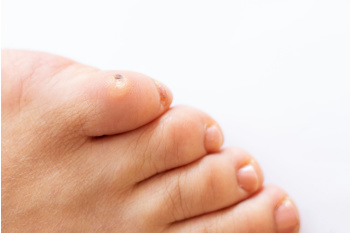 Corns on the feet are often the result of rubbing and mechanical stress on the skin. When there is repetitive friction on a certain area of the foot, the skin may respond by thickening and forming a hardened, raised bump known as a corn. Bony prominences, such as the toes or the sides of the feet, are more susceptible to corn development caused by rubbing against the shoes. Corns can also form in response to wearing ill-fitting footwear, high heels, or possibly from having foot deformities that alter the distribution of weight and pressure on the feet. While corns themselves are not usually harmful, they can cause discomfort or pain, especially when walking or wearing shoes. Podiatrists, or foot doctors, can address corns through various treatments, such as trimming, padding, or orthotic devices to provide relief. If you are struggling with corns on the feet, it is suggested that you consult a podiatrist for personalized treatment options.
Corns on the feet are often the result of rubbing and mechanical stress on the skin. When there is repetitive friction on a certain area of the foot, the skin may respond by thickening and forming a hardened, raised bump known as a corn. Bony prominences, such as the toes or the sides of the feet, are more susceptible to corn development caused by rubbing against the shoes. Corns can also form in response to wearing ill-fitting footwear, high heels, or possibly from having foot deformities that alter the distribution of weight and pressure on the feet. While corns themselves are not usually harmful, they can cause discomfort or pain, especially when walking or wearing shoes. Podiatrists, or foot doctors, can address corns through various treatments, such as trimming, padding, or orthotic devices to provide relief. If you are struggling with corns on the feet, it is suggested that you consult a podiatrist for personalized treatment options.
If you have any concerns regarding your feet and ankles, contact David Williams, DPM of El Paso Feet. Our doctor will treat your foot and ankle needs.
Corns: What Are They? and How Do You Get Rid of Them?
Corns can be described as areas of the skin that have thickened to the point of becoming painful or irritating. They are often layers and layers of the skin that have become dry and rough, and are normally smaller than calluses.
Ways to Prevent Corns
There are many ways to get rid of painful corns such as wearing:
- Well-fitting socks
- Comfortable shoes that are not tight around your foot
- Shoes that offer support
Treating Corns
Treatment of corns involves removing the dead skin that has built up in the specific area of the foot. Consult with Our doctor to determine the best treatment option for your case of corns.
If you have any questions please feel free to contact our office located in El Paso, TX . We offer the newest diagnostic and treatment technologies for all your foot and ankle needs.
Custom Orthotics Seasonal - Any Season

Rain or shine, snow or sleet, Custom Orthotics have your feet covered! As the seasons change, ensure your steps remain comfortable and supported. Custom Orthotics adapt to your footwear, from summer sandals to winter boots, providing consistent relief and alignment. Don't let the changing weather dictate your foot comfort. Step confidently year-round and experience the difference with Custom Orthotics. Call today for more information.
Foot Injuries From Rock Climbing
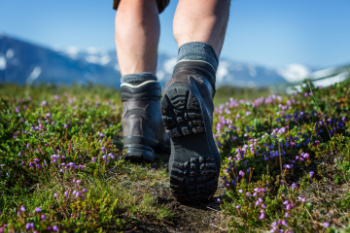
Rock climbing, an exhilarating sport enjoyed by many, can also pose risks of foot injuries, both acute and chronic. Acute injuries often occur due to sudden trauma or overuse during climbs. Common acute foot injuries include sprains, strains, fractures, and abrasions, often resulting from slips, falls, or improper foot placements. Climbing shoes, designed for precision and grip, can exacerbate foot issues if they fit too tightly or lack proper support. Wearing ill-fitting shoes may lead to blisters, corns, or ingrown toenails, while prolonged use can contribute to conditions like plantar fasciitis or tendonitis. If you participate in rock climbing and have sustained a foot injury, it is suggested that you schedule an appointment with a podiatrist for diagnosis and treatment. These healthcare professionals can also provide guidance on proper shoe fit, and recommend supportive inserts, and custom-made orthotics.
Sports related foot and ankle injuries require proper treatment before players can go back to their regular routines. For more information, contact David Williams, DPM of El Paso Feet. Our doctor can provide the care you need to keep you pain-free and on your feet.
Sports Related Foot and Ankle Injuries
Foot and ankle injuries are a common occurrence when it comes to athletes of any sport. While many athletes dismiss the initial aches and pains, the truth is that ignoring potential foot and ankle injuries can lead to serious problems. As athletes continue to place pressure and strain the area further, a mild injury can turn into something as serious as a rupture and may lead to a permanent disability. There are many factors that contribute to sports related foot and ankle injuries, which include failure to warm up properly, not providing support or wearing bad footwear. Common injuries and conditions athletes face, including:
- Plantar Fasciitis
- Plantar Fasciosis
- Achilles Tendinitis
- Achilles Tendon Rupture
- Ankle Sprains
Sports related injuries are commonly treated using the RICE method. This includes rest, applying ice to the injured area, compression and elevating the ankle. More serious sprains and injuries may require surgery, which could include arthroscopic and reconstructive surgery. Rehabilitation and therapy may also be required in order to get any recovering athlete to become fully functional again. Any unusual aches and pains an athlete sustains must be evaluated by a licensed, reputable medical professional.
If you have any questions please feel free to contact our office located in El Paso, TX . We offer the newest diagnostic and treatment technologies for all your foot and ankle needs.
Orthotics for Children With Mobility Issues
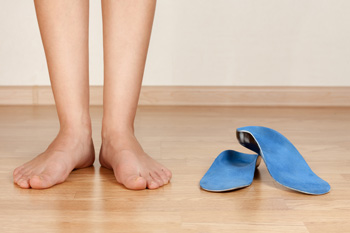
Custom-made orthotics can play an important role in addressing mobility issues in children, especially those with conditions like flat feet, cerebral palsy, or developmental delays. These orthotic devices are tailor-made to fit the unique needs of each child's feet, providing support, stability, and alignment correction. They can help alleviate pain, improve gait patterns, and enhance overall mobility and function. In conjunction with protective footwear, custom orthotics can significantly enhance the child's comfort and quality of life. If your child has mobility issues, it is suggested that you make an appointment with a podiatrist to see if custom-made orthotics can help provide support and functionality for the child's activities and lifestyle.
The benefits of custom orthotics are far-reaching and can make a significant impact on your daily life. Whether you are an athlete looking to enhance your performance, a healthcare worker on your feet every day, someone who experiences chronic foot pain, or someone who wants to improve their overall comfort and well-being, custom orthotics can be a game changer.
Custom orthotics provide support, stability, and relief for a variety of foot conditions ranging from flat feet to heel pain. They can even help prevent injuries and address more severe foot concerns, such as plantar fasciitis and diabetic foot issues.
Contact David Williams, DPM at El Paso Feet to create tailored orthotics for you and enjoy a higher quality of life, reduced pain, and increased mobility. With the right orthotics, you can continue doing the things you love, whether it’s running, dancing, or simply walking comfortably without discomfort.
If you are suffering from foot discomfort or have concerns about your foot health, do not hesitate to contact David Williams, DPM at El Paso Feet to explore the benefits of orthotics for you. Your feet are the foundation of your body and investing in their well-being can lead to a happier, healthier, and more active lifestyle. Your feet will thank you!
If you have any questions please contact our office located in El Paso, TX . We offer the newest diagnostic and treatment technologies for all your foot and ankle needs.
Daily Habits for Diabetic Foot Care
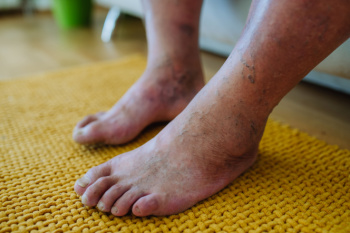 Daily habits for diabetic foot care are essential to prevent complications that can arise from diabetes, such as infections and ulcers. Regular inspection of the feet for cuts, blisters, or red spots can help address any issues head-on. It is also important the feet are kept clean and moisturized, while avoiding lotion between the toes to prevent fungal infection. Proper shoe choice can enhance comfort and prevent blisters. It is helpful not to walk barefoot to reduce the risk of injury. Additionally, managing blood sugar levels helps maintain healthy circulation and nerve function in the feet. Regular check-ups with a podiatrist play a key role in diabetic foot care. These foot doctors can professionally assess the health of your feet, provide specialized care for any issues detected, and offer personalized advice on proper foot care practices. These visits help in early detection and treatment of potential foot problems, reducing the risk of serious complications. If you are a diabetic patient at risk for foot complications, it is suggested that along with daily foot care, you add a podiatrist to your health care team.
Daily habits for diabetic foot care are essential to prevent complications that can arise from diabetes, such as infections and ulcers. Regular inspection of the feet for cuts, blisters, or red spots can help address any issues head-on. It is also important the feet are kept clean and moisturized, while avoiding lotion between the toes to prevent fungal infection. Proper shoe choice can enhance comfort and prevent blisters. It is helpful not to walk barefoot to reduce the risk of injury. Additionally, managing blood sugar levels helps maintain healthy circulation and nerve function in the feet. Regular check-ups with a podiatrist play a key role in diabetic foot care. These foot doctors can professionally assess the health of your feet, provide specialized care for any issues detected, and offer personalized advice on proper foot care practices. These visits help in early detection and treatment of potential foot problems, reducing the risk of serious complications. If you are a diabetic patient at risk for foot complications, it is suggested that along with daily foot care, you add a podiatrist to your health care team.
Diabetic foot care is important in preventing foot ailments such as ulcers. If you are suffering from diabetes or have any other concerns about your feet, contact David Williams, DPM from El Paso Feet. Our doctor can provide the care you need to keep you pain-free and on your feet.
Diabetic Foot Care
Diabetes affects millions of people every year. The condition can damage blood vessels in many parts of the body, especially the feet. Because of this, taking care of your feet is essential if you have diabetes, and having a podiatrist help monitor your foot health is highly recommended.
The Importance of Caring for Your Feet
- Routinely inspect your feet for bruises or sores.
- Wear socks that fit your feet comfortably.
- Wear comfortable shoes that provide adequate support.
Patients with diabetes should have their doctor monitor their blood levels, as blood sugar levels play such a huge role in diabetic care. Monitoring these levels on a regular basis is highly advised.
It is always best to inform your healthcare professional of any concerns you may have regarding your feet, especially for diabetic patients. Early treatment and routine foot examinations are keys to maintaining proper health, especially because severe complications can arise if proper treatment is not applied.
If you have any questions please feel free to contact our office located in El Paso, TX . We offer the newest diagnostic and treatment technologies for all your foot and ankle needs.
Get Proper Treatment for Ankle Injuries
Symptoms and Management of Bunions
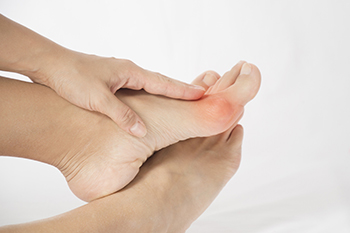
Bunions, a common foot condition, present noticeable symptoms that can affect daily life. One prominent indication is a bony bump that forms at the base of the big toe, causing it to lean inward toward the other toes. This misalignment often leads to pain, swelling, redness, and restricted movement in the affected area. As bunions progress, they can cause discomfort, making it challenging to find comfortable footwear and engage in regular activities. However, several strategies can help manage bunions and alleviate symptoms. Wearing shoes with a wide toe box can reduce pressure on the bunion and provide ample space for the toes. Engaging in gentle stretching exercises can help to relieve pain and inflammation. In severe cases, where conservative measures fail to provide relief, surgical intervention may be considered to correct the underlying structural deformity. If you have a bunion, it is suggested that you are under the care of a podiatrist who can monitor its progression, and offer effective management techniques.
If you are suffering from bunion pain, contact David Williams, DPM of El Paso Feet. Our doctor can provide the care you need to keep you pain-free and on your feet.
What Is a Bunion?
Bunions are painful bony bumps that usually develop on the inside of the foot at the joint of the big toe. As the deformity increases over time, it may become painful to walk and wear shoes. Women are more likely to exacerbate existing bunions since they often wear tight, narrow shoes that shift their toes together. Bunion pain can be relieved by wearing wider shoes with enough room for the toes.
Causes
- Genetics – some people inherit feet that are more prone to bunion development
- Inflammatory Conditions - rheumatoid arthritis and polio may cause bunion development
Symptoms
- Redness and inflammation
- Pain and tenderness
- Callus or corns on the bump
- Restricted motion in the big toe
In order to diagnose your bunion, your podiatrist may ask about your medical history, symptoms, and general health. Your doctor might also order an x-ray to take a closer look at your feet. Nonsurgical treatment options include orthotics, padding, icing, changes in footwear, and medication. If nonsurgical treatments don’t alleviate your bunion pain, surgery may be necessary.
If you have any questions, please feel free to contact our office located in El Paso, TX . We offer the newest diagnostic and treatment technologies for all your foot care needs.

